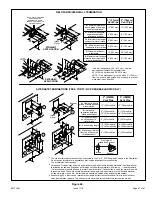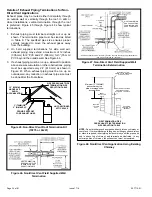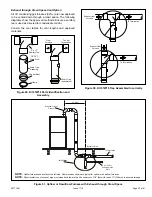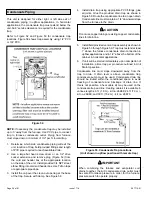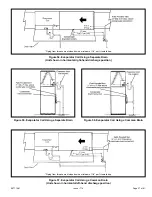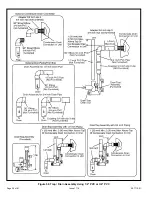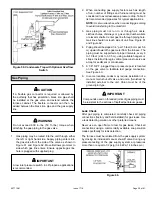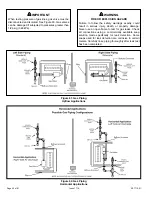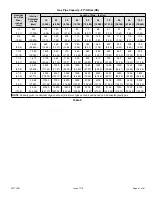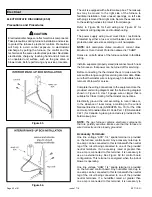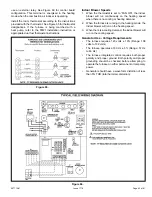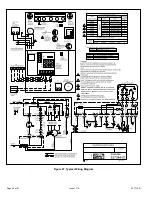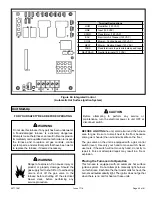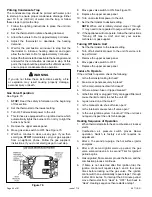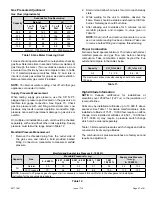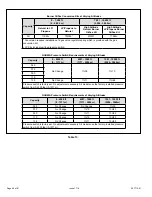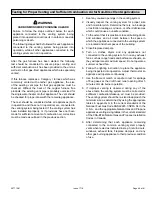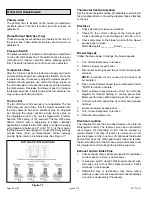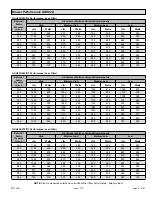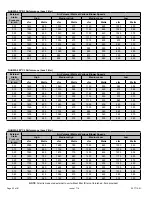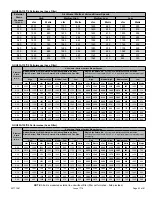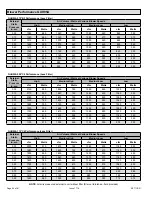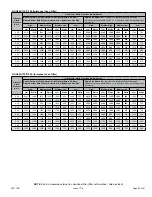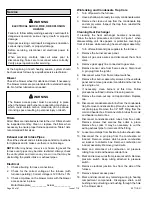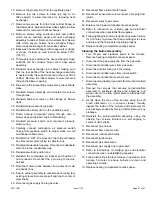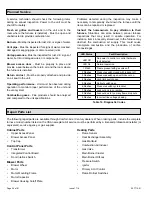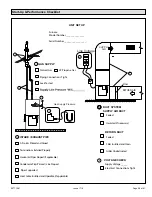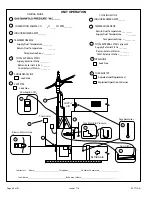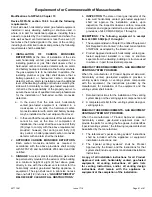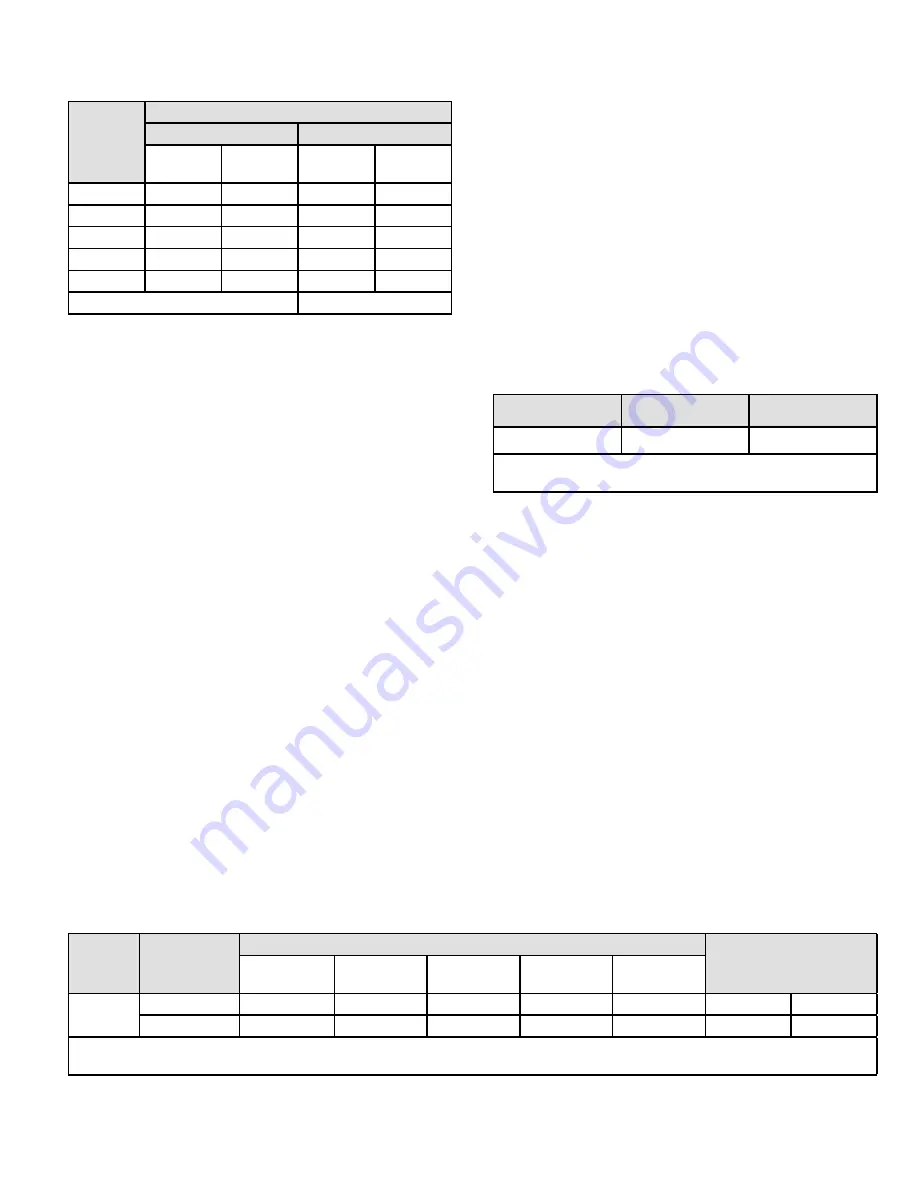
507715-01
Page 47 of 61
Issue 1716
Gas Pressure Adjustment
Gas Flow (Approximate)
Table 10. Gas Meter Clocking Chart
Capacity
Seconds for One Revolution
Natural
LP
1 cu ft
Dial
2 cu ft
Dial
1 cu ft
Dial
2 cu ft
Dial
-045
80
160
200
400
-070
55
110
136
272
-090
41
82
102
204
-110
33
66
82
164
-135
27
54
68
136
Natural - 1000 btu/cu ft
LP - 2500 btu/cu ft
Furnace should operate at least 5 minutes before checking
gas flow. Determine time in seconds for two revolutions of
gas through the meter. (Two revolutions assures a more
accurate time.) Divide by two and compare to time in Table
10. If manifold pressure matches Table 12 and rate is
incorrect, check gas orifices for proper size and restriction.
Remove temporary gas meter if installed.
NOTE:
To obtain accurate reading, shut off all other gas
appliances connected to meter.
Supply Pressure Measurement
When testing supply gas pressure, use the 1/8” N.P.T.
plugged tap or pressure post located on the gas valve to
facilitate test gauge connection. See Figure 70. Check
gas line pressure with unit firing at maximum rate. Low
pressure may result in erratic operation or underfire. High
pressure can result in permanent damage to gas valve or
overfire.
On multiple unit installations, each unit should be checked
separately, with and without other units operating. Supply
pressure must fall within range listed in Table 12.
Manifold Pressure Measurement
1. Remove the threaded plug from the outlet side of
the gas valve and install a field provided barbed
fitting. Connect to a manometer to measure manifold
pressure.
2. Start unit and allow 5 minutes for unit to reach steady
state.
3. While waiting for the unit to stabilize, observe the
flame. Flame should be stable and should not lift from
burner. Natural gas should burn blue.
4. After allowing unit to stabilize for 5 minutes, record
manifold pressure and compare to value given in
NOTE:
Shut unit off and remove manometer as soon
as an accurate reading has been obtained. Take care
to remove barbed fitting and replace threaded plug.
Proper Combustion
Furnace should operate minimum 15 minutes with correct
manifold pressure and gas flow rate before checking
combustion. Take combustion sample beyond the flue
outlet and compare to the tables below.
Table 11.
Capacity
CO
2
% for Nat
CO
2
% for L.P.
All
7.2 - 7.9
8.6 - 9.3
The maximum carbon monoxide reading should not exceed
100 ppm.
High Altitude Information
NOTE:
In Canada, certification for installations at
elevations over 4500 feet (1371 m) is the jurisdiction of
local authorities.
Units may be installed at altitudes up to 10,000 ft. above
sea level. See Table 11 for derate manifold values. Units
installed at altitude of 7501 - 10,000 feet require an orifice
change. Units installed at altitudes of 4,501 - 10,000 feet
(1371 -3048 m) may require a pressure switch change
which can be ordered separately.
Table 13 lists required pressure switch changes and orifice
conversion kits at varying altitudes.
The combustion air pressure switches are factory set and
require no adjustment.
Table 12.
Manifold and Supply Line Pressure 0 - 10,000 ft.
Capacity
Gas
Manifold Pressure in. w.g.
Supply Line Pressure
in. w.g.
0 - 10,000 ft.
0 - 4,500 ft.
4,501 - 5,500
ft.
5,501 - 6,500
ft.
6,501 - 7,500
ft.
7,501 -
10,000 ft.
All
Natural
3.5
3.3
3.2
3.1
3.5
4.5
13.0
LP / Propane
10.
9.4
9.1
8.9
10.0
11.0
13.0
NOTE
: A natural to LP propane gas changeover kit is necessary to convert this unit. Refer to the changeover kit installation
instruction for the conversion procedure.

